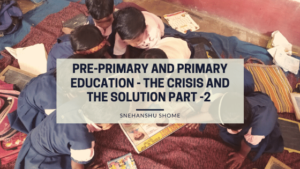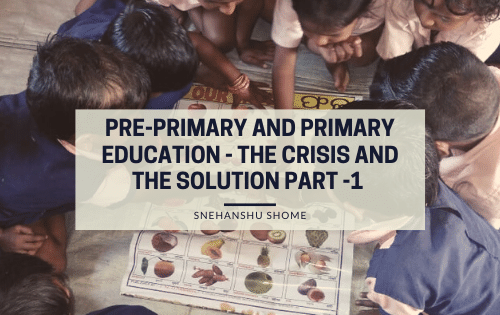Deep-Rooted Issues of Pre-Primary Education in India
“Learning to stand in somebody else’s shoes, to see through their eyes, that’s how peace begins. And it’s up to you to make that happen. Empathy is the quality of character that can change the world” – Barack Obama
With the advent of the National Policy, yet still in draft, one of the major policy changes that we might see is in the area of pre-primary education. With that in line, it is a good time to revisit the existing pre-primary education space of this country and talk about our work in that space.
In the last many years a lot has been done in the field of Early Childhood Care and Education (ECCE). As a country, we have seen the setting up of private playschools, Child Care Centres by different NGOs as well as Government-run Anganwadi centers. Anganwadi centers were started in 1975 under the government’s Integrated Child Development Services Program. Since then and now, the country has well over 13 Lakhs Anganwadis, providing nutrition and education to kids across villages.
In a longitudinal study, it was found that across the country, a lot of these institutions were not using age and developmentally suitable curriculum, methods, and materials to involve children. This study was conducted by UNICEF, in partnership with the Centre for Early Childhood Education and Development (CECED), Ambedkar University Delhi and ASER Centre. The results of this study are not so surprising, even with 13 lakh Anganwadis and other private run pre-school centers, there is still an absence of a national policy yet which actually addresses the characteristics of the ECCE program. To add on to it, teaching kids who are that young require more scientific techniques than usual, one that dwells with various physical, cognitive, or social skills. Without a policy framework in action, or necessary training being provided to educators, the results may not improve.
I have had the opportunity to work closely with several Anganwadi workers recently. ThinkZone is an Odisha-based social enterprise that is working to bridge the learning-gaps among children using technology-based teaching. Among its many programs, there is one program dedicated to the children studying in Anganwadi. I have been a part of that program since and currently, we are working with the government to tackle several educational issues in 70 Anganwadis across two districts. In these one year, I have tried to closely understand the issues in Anganwadis and the several roles of an Anganwadi worker.
Let’s talk about an Anganwadi worker, an Anganwadi worker (AWW) is a female selected from within the community. Since the AWW belongs to the community she is expected to look at all the schemes launched by the government, including ration card, AADHAR card, the formation of Self Help Groups, assisting ASHAs, and so on. In total, an AWW has 21 responsibilities assigned by ICDS. Among the 21 responsibilities, some are designed as initial activities, some are periodical and some are daily activities. Daily responsibilities that an AWW is expected to undertake are to provide the preschool program, supplementary nutrition, maintain records by visiting individual homes several times. Maintaining records is the most essential as well as a complex process. Each AWW is required to maintain 13 registers officially and much more unofficially. The records range from supplementary nutrition to administering surveys. Periodical activities are immunization, height, and weight check-ups, keeping records, distributing Vitamin-A tablets. An Anganwadi worker also has to attend periodic meetings conducted by supervisors or other organizations working with the government like ThinkZone.
All these seem like an impossible task to perform single-handedly. The entire onus of any Anganwadi lies on one Anganwadi worker and with the growing need among government and other agencies to measure educational and nutritional impact, AWW usually bears the burden of performing poorly on any one of their roles and are easy to be blamed. And yet out of the many Anganwadi didi (in the way I personally like to call them), I have met, most of them attend regular sector meetings with enthusiasm, whenever you visit a center, they are full of life, with children singing and dancing. Despite all the irrational workloads and often disapproval or disrespect from the community, they still perform their duty without even a question.
During the workshops conducted as a part of the Quality Initiative Program, we spent a lot of time with Anganwadi didis. Under the program, we encouraged them to use our technology platform for better management and utilizing our proprietary activities and teaching resources to shift from usual teaching methods to an activity-based teaching methodology. Even during the training sessions, they seemed to be very excited to use technology or teaching resources in their classroom but eventually, when they went back from their training, we saw that the use was very limited. Another observation during the training sessions was that the Anganwadi workers already had the entire knowledge of the intricacies of the ECCE program. And yet they could not implement it easily.
The foremost thing which is necessary to implement any program is ‘time’. Amidst all the activities assigned an AWW hardly gets one hour to conduct the preschool program in the center. Even if an Anganwadi didi wants to do something for the children, the irregularities of them getting some other work, and children turning up to the centers irregularly make her difficult to do this job. The issue is also a loop, where the parents are reluctant to send the kids to Anganwadis because they don’t see the value in it and the Anganwadi didis find it difficult to teach children because the turnout is so scanty. Parents usually prefer to send their children to good Child Care Centres. The idea of sending a kid to a privately managed institution seems lucrative to parents because subconsciously we all sometimes give value to the services which we pay for over free services.
The idea that children can learn while playing, singing or dancing is still an absurd idea to many parents. They want to substitute it with formal education and this is what also pushes a lot of parents to send kids early to schools or child care centers. A privately managed center is usually made lucrative for parents to give focus just on basic numeracy, alphabets, simple words. In rural areas, this phenomenon is much higher. Giving children formal education at earlier years of life turns out to hamper imagination, social, language and physical skills in kids. And they enter school without these abilities which hamper their further education. But in Anganwadi, the curriculum is designed in such a way that children will explore, experiment, manipulate, solve the problem, play, tell stories, talk, discuss, reflect, and learn. The focus is on the holistic development of the child rather than only on a few cognitive and language skills.
The problem within Anganwadi centers is no less, even if the curriculum is designed to be age-appropriate, Anganwadi didis find it very hard to implement any of it due to the limitations of time. The easiest solution is cooperation between the community and Anganwadi didis. At the centers where ThinkZone is currently working, we are trying to maintain a balance between the community and Anganwadi didis. It is only if the parents trust the system, send their kids on time, and regularly can they expect a change.
Also, like schools, the community needs to build an ownership of its Anganwadis, they need to help when required for things like better infrastructure and also push Anganwadi didis to make pre-primary education a daily thing in Anganwadis. At ThinkZone we are also planning to train the Anganwadi helpers so that they can take the role of Anganwadi didis when they are not around and also help them in everything including education. Our aim is to help Anganwadi didis and helpers to manage time more efficiently so that they can spend ample time helping in the holistic development of kids and the kids do not return home only with nutrition.
With policy changes in line and several other organizations working in the same space, we are hopeful that a small change in the system of the pre-primary education system can help bring a much bigger and required change across the country.


